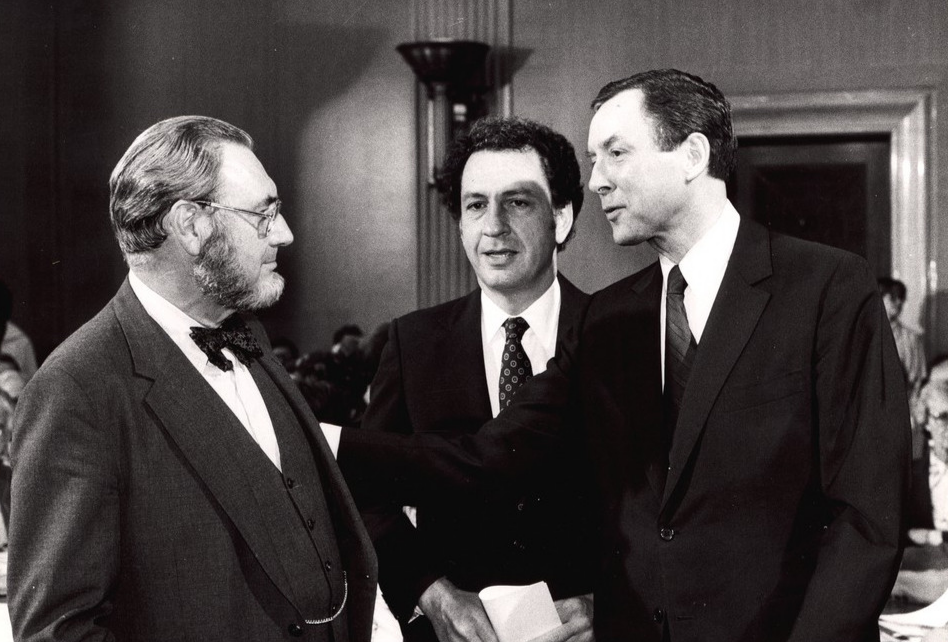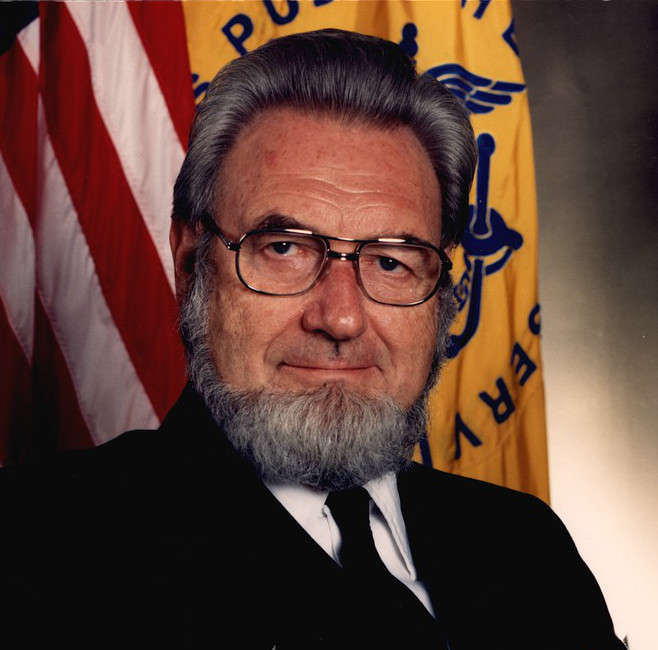
From the blog of the Centre for Applied Christian Ethics at Wheaton College
In June, 1973, just six months after Roe vs Wade, C. Everett Koop launched the evangelical war on abortion here at Wheaton. When he passed in 2013, he was revered by evangelicals and atheists alike. Now Roe has been overturned it’s good to be reminded of this remarkable man, described by Harold O.J. Brown as the most prominent evangelical in American public life since William Jennings Bryan.
Nigel M. de S. Cameron
Way back in 1948 a young nurse named Erna Goulding urged a brash young surgeon who had recently arrived at Philadelphia’s storied Children’s Hospital to go hear her minister, Donald Grey Barnhouse – the famous incumbent of Tenth Presbyterian Church just a few blocks north. But he didn’t; not that week. The following Sunday – as he would later write – after Grand Rounds finished early he “found his feet taking him” to Tenth and “quietly slipped up to the gallery.” Sixty years later, on September 12, 2008, he would present the church with a new organ; because, as the dedication reads, it was at Tenth that he “was confronted by the claims of Jesus Christ.”
While it was Koop’s controversial 1981 nomination as Surgeon General by President Reagan that made him a household name across America, it’s important to remember his significance long before. At the time of his nomination, he was both the world’s most prominent pediatric surgeon, and America’s best-known pro-life physician. As I work on his biography, interviewing surviving friends and colleagues and digging through archives (including some here at Wheaton – there are Koop papers both at CACE and in the library’s Special Collections), it’s striking how little we appreciate his role as an influential evangelical leader right through the second half of the twentieth century.
Barnhouse, whose preaching Koop heard that evening, was a central figure in the emerging mid-century “neo”-evangelicalism that was rapidly expanding in the post-War period, transforming and transcending old-style “fundamentalism.” In parallel with his pulpit oratory and his role rallying conservatives within the mainstream presbyterian denomination, Barnhouse was a pioneer of radio ministry – and publisher of the widely-read magazine Eternity. Shortly after his arrival at Tenth, and his almost immediate conversion, Koop teamed up with Barnhouse to run this wider ministry. From 1951, for nearly twenty years, he served as president of Barnhouse’s Evangelical Foundation (now part of the Alliance of Confessing Evangelicals). These two tall, intellectually precocious, and ferociously energetic men quickly bonded. And Koop would go on to network with the key evangelical leaders of the day, including both Billy Graham (whom one Christmas he persuaded to visit Children’s Hospital, to the consternation of a Jewish physician who was there and told me the story!) and doyen of evangelical theologians Carl F.H. Henry (whom he apparently persuaded to become pro-life one night over dinner). What’s more, Koop understood the strategic significance of organizations. As he stated during his Senate confirmation hearing, in the mid-50s he was a co-founder of MAP International, second only to the Red Cross in U.S. global relief efforts. And twenty years later he worked closely with his friend Harold O.J. Brown in founding the key evangelical pro-life group, the Christian Action Council (now CareNet). After Koop passed in 2013, at the age of 96, Christianity Today’s obit designated him the man who “taught evangelicals to hate abortion.”
Perhaps by some special providence, Koop’s daughter Betsy was set to graduate from Wheaton in the summer of that marquee year, 1973. The college adroitly took the opportunity to invite her famous surgeon dad to speak at Commencement. Koop starts off his speech by telling the assembled graduates that he will spare them the standard platitudes! The thunderous address that followed, “Of law, of life, and the days ahead,” was a rallying-cry to every evangelical to join the then largely Catholic pro-life movement. It kicked off eight barnstorming years during which his considerable powers of persuasion and almost superhuman energies were deployed to devastating effect – a campaign culminating in his famous collaboration with his old friend philosopher-theologian Francis Schaeffer on the movie series Whatever Happened To The Human Race? The movies took Koop away from most of his medical duties for 18 months in the late 70s, and finally pushed mainstream evangelical opinion on abortion over the top. At the same time he was delivering exactly the same message to his surgeon peers. Awarded the prestigious Ladd medal in 1976, instead of sharing his latest dazzling surgical techniques he provoked a roomful of embarrassed surgeon colleagues with the exact thesis of Whatever Happened (abortion leads to infanticide leads to euthanasia) under the title The Slide to Auschwitz.
The genesis of the movie series (still terrific viewing; you can find it on YouTube) is itself rather interesting. Koop had known the Schaeffers from around 1950 when he had operated on one of their children. Years later Koop and Schaeffer met up by chance while on speaking gigs on a Canadian campus, and got to chatting about collaborating in the pro-life cause. A few months later Koop visited L’Abri, the Schaeffers’ center in Switzerland, and spent an evening with son Franky Schaeffer, who had played a key role in his dad’s How Should We Then Live? movie series. As Frank tells it (he now goes by Frank), they sketched out the series together, and then persuaded Schaeffer senior to go along with it – in part as a way of finding work for his son! Frank has since shifted his views quite a bit, and published how much he regrets his role in helping his dad build the “religious right.” Yet when we spoke recently he told me he retained the highest regard for Koop, and had kept up with him during his years in Washington.
After stepping down as Surgeon General in 1989, Koop was confronted with a kaleidoscope of opportunities; he had approaches from around two hundred colleges and universities! One of the first he accepted was an invitation to chair the National Advisory Council of Wheaton’s Center for Applied Christian Ethics (CACE), then being developed under the guidance of Professor Alan Johnson. Every six months the Council would meet, and Koop would give a lecture – sometimes to the select few, sometimes to the entire College community.
As I wrote recently in The American Journal of Bioethics,
“The remarkable impact on America of bearded, Presbyterian social conservative C. Everett Koop – “Chick” to his friends – continues to reverberate. Hailed as “immortal” by the editor of USA Today (AP called him a “rock star”), Koop became extraordinarily well-known as the 13th Surgeon General of the United States. At his 90th birthday party Senator Orrin Hatch lauded him as “one of the most popular people in the history of government.”
Whether our primary interest is in his decisive role in shaping public attitudes toward issues of public health – smoking, AIDS, obesity, breast-feeding, domestic abuse, drunk driving, and the care of handicapped babies; or his (re)shaping the evangelical view of abortion; or his commitment to the College and the work of CACE – 40 years after his nomination as Surgeon General it’s a good time to be reminded of Koop’s extraordinary commitment to the faith, to human life, and also to science. As the New Yorker’s Michael Specter wrote shortly after his passing, he “turned out to be a scientist who believed in data at least as deeply as he believed in God.” What better illustration of Art Holmes’ enduring dictum that “All truth is God’s truth.”
I first got to know Chick Koop back in the mid-80s, and was later privileged to serve on the CACE National Advisory Council, at his invitation. The biography will be published with the University of Massachusetts Press in 2025. Meanwhile I am blogging about the process of writing it on Substack.





